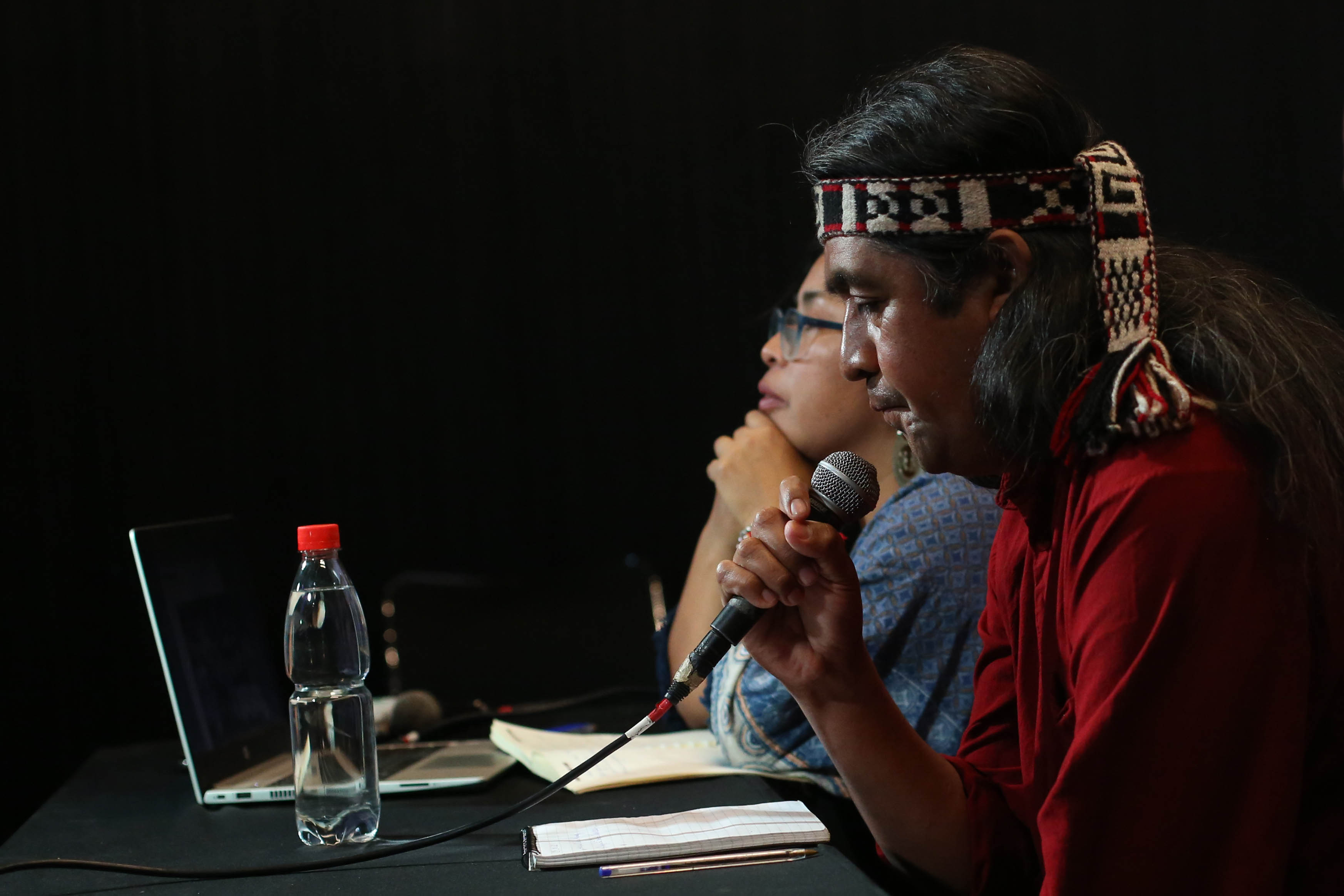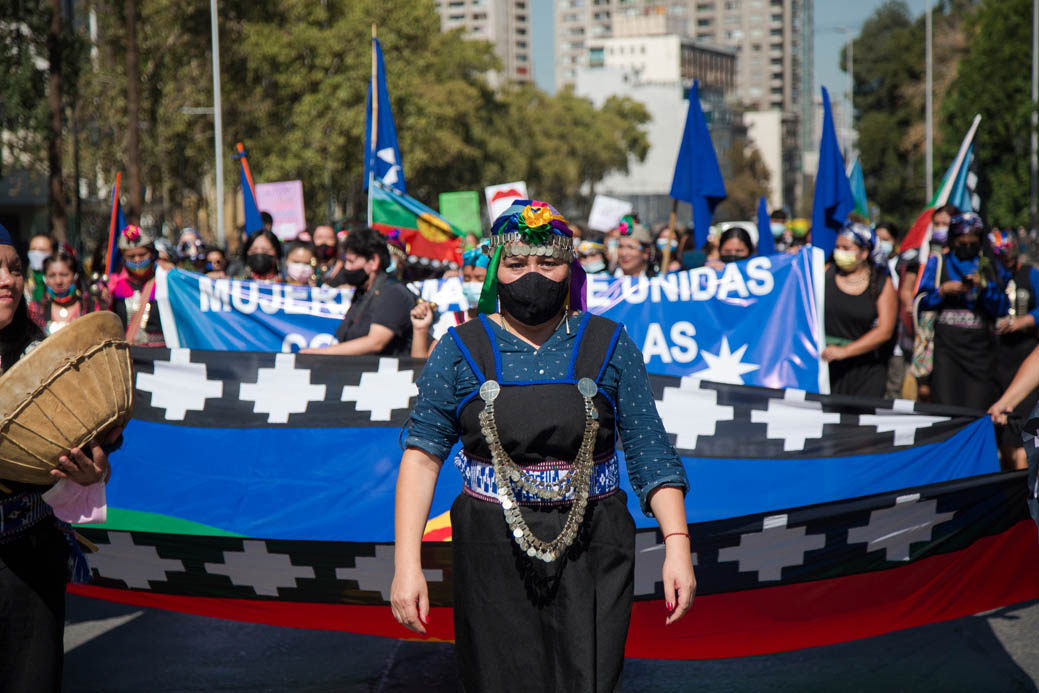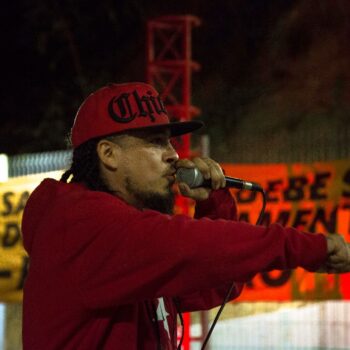Imagine resisting the Spanish invasion for 350 years only to have to deal with a Chilean state that continues to colonize indigenous territories. This is the reality of the Mapuche: Mapu, meaning the land, and Che, meaning the people. The “people of the land” whose land has been stolen. The Mapuche struggle was front and center during the social uprising of 2019. One reason was the violent murder of the young Mapuche leader Camilo Catrillanca by the Chilean police in 2018, which sparked anger on a national level and put the spotlight on the Mapuche struggle. The Mapuche flag became a symbol of resistance — at Plaza Dignidad, there were more Mapuche flags than Chilean flags.
President Gabriel Boric spoke to the Mapuche struggle during his campaign, and it also became a central talking point of the Apruebo campaign for the new constitution. Yet the constitution did not guarantee that the Mapuche would get their land back, and many felt like the new government was using them as a symbol while continuing to oppress them. I connected with Jaime Huenchullan of the liberated Temicuicui territory as well as Jakeline Curaqueo, President of the Center for Mapuche Studies and Research, about what the new constitution would have meant for the Mapuche people. Our interview, which has been edited and condensed, took place before the September 4th plebiscite.
What is your opinion of the plebiscite on September 4, where it’s mandatory for all Chilean citizens to vote?
Jaime Huenchullan: As Mapuche, our position is very opposed to the new policy of denial and discrimination in this new constitution. In what sense? Well, although it’s true that this new constitution was written by approximately 150 members, consisting of women and men from different sectors — the diverse representation of the constituent delegates is valuable — none of these delegates who call themselves “progressive” supported the regulations and articles presented by some members of our native peoples, of the Mapuche people, who won the “reserved seats.” On the contrary, they voted against them.
In this sense, we see that, once again, we have a state that wants to settle this territory, imposing its will as a dominant force over the Mapuche people. So, this racist policy hasn’t changed since the creation of the Chilean Republic, through dispossession and plundering in the Wallmapu [Mapuche ancestral territory]. This is very concerning, and what remains is for the Mapuche autonomist movements to keep getting stronger and continue advancing toward what they’ve been developing in recent decades, which is to rebuild ourselves as a Mapuche nation, to recover the territory usurped by transnational corporations and businessmen, and advance toward self-determination, toward the liberation of our people from all the colonialist, repressive and genocidal domination of the Chilean state.
Jakeline Curaqueo: Our analysis is that it would be the same situation for us. The Chilean state has always played the Mapuche card to rise to power: the repression, militarization, persecution, dispossession, and racism of the powerful classes is the same. The political parties or colors (this is seen very clearly today with the current government), all the different colors “play” with the Mapuche; their idea is to subjugate and undermine our people and our struggle for land in Wallmapu, in all its dimensions. There are no minimum guarantees in any text as long as there is no real recognition of our demands. The dispossession of our lands and the non-intervention of capital and extractivism are not really covered by this new constitution. Nor is the acknowledgment of genocide, reparation, and compensation for all the massacres that were committed throughout history by the Chilean state. The privileges of the business sector and the extractivist model in all its dimensions remain intact. A “new democracy” can’t begin without recognizing or expelling the model of death of the earth that comes with the capitalist model, which contradicts our way of life and how we conceive of the world.
How would the new constitution affect the lives of the Mapuche people, if it’s approved?
JH: We see a continuous discrimination, a historical racism by the different governments administrating the Chilean state, ever since they invaded the Mapuche territory by force and domination. And, in that sense, this new Constitution wouldn’t represent us, in terms of recognition and truth with the native peoples, and particularly with the Mapuche people. They haven’t wanted to recognize the genocide committed by the state when it occupied and plundered the territory of the Mapuche people.
JC: There are no guarantees for our Mapuche people. Throughout the history of dispossession during the (Chilean) republican period, the policies toward our people have been of annihilation and extermination. Later, with these democratic states, as I was saying, regardless of political colors, they are in a constant war with us, a low-intensity war. This is expressed in several ways, but especially in the political persecution of our people, which has resulted in assassinations, imprisonment, and constant militarization in the Wallmapu.
Therefore, there are no guarantees for us here. There is total distrust, and we believe they will continue this war, even though all we have wanted for centuries is for them to leave us alone with our society. But they don’t seek “peace” or “dialogue,” only the annihilation and elimination of the Mapuche. It will be a similar period now, or the Chilean state may even intensify its policies in our communities.
How has President Boric’s administration treated the Mapuche people?
JC: It’s the same as previous governments: militarization, repression, persecution, and other systematic violence, as we’ve already seen. Sentences using the Internal Security Law, the Antiterrorist Law.
JH: President Gabriel Boric has been in office for a couple of months, and he was elected by many voters, mainly by young people, which also included many indigenous and Mapuche people, who trusted in his promises to create more harmonious relations with the Mapuche people, since historically the State has waged a permanent war against us. And, although the government of Boric and all his ministers had used terms from the Mapuche struggle — such as “Wallmapu” and “Mapuche political prisoners” — it wasn’t long before that discourse changed.
One minister, on this administration’s fourth day in office, tried to enter Temucuicui, merely to achieve publicity and a good image for her government, to show that they were establishing a new relationship. But we knew what it meant for the minister to enter a territory that has historically struggled, made demands, defended itself from oppression — in a territory and a community whose members have been constantly persecuted, where Mapuche brothers have been murdered by the agents of repression such as the “Jungle Commando” and the military. So, after that boycott of Minister Siches’s entry, they immediately changed their policy toward the Mapuche people.
They had promised to demilitarize the Wallmapu, to close a military police base that was installed in Pailahueque, right next to a technical-professional high school, where most students are Mapuche from the Malleco area and other nearby cities. That base wasn’t closed, it wasn’t removed — on the contrary, more weapons, tanks, helicopters, technological resources, drones, unmanned planes are continuously spying on and repressing the mobilized communities that are advancing and recovering their lands. They’re still deployed there! With Boric’s government, the Constitutional State of Emergency has been extended once again, which means permanently militarizing the Mapuche territory. Lately, the Boric government has been sending commando troops to settle within Mapuche territory. And that’s going to bring more repression, more violence, more state terrorism against Mapuche communities and the organizations that are advancing towards autonomy and the recovery of our territory.

From a Mapuche perspective, how do you feel about the Chilean social uprising?
JC: From the beginning, we thought this uprising was not going to last that long. I thought they would give up quickly, but it was good to see that small beacon of hope, of a people awakening, to escape this modern slavery.
We were always alone, shouting out what was happening in this society. Hopefully the struggle continues, since this constitutional change now must be made viable and implemented. There’s a lot to fight for — this is just the beginning! Hopefully they won’t abandon this resistance and they’ll join our project of life and not the death project of neoliberal capitalism. It’s extremely important that this social uprising has also rested on an almost unique people on the American continent (or Abya Yala), who have resisted and haven’t given up. And, as a result of this, social explosions have arisen in other countries throughout the region, together with the indigenous peoples, and the struggle has been more dignified!
That’s the fear of this state. I don’t think it’s the state either — the fear comes from the bowels of neoliberalism. That’s where they will wage war on us because we’re gaining a lot of ground in this ideological and power struggle. Power for us means focusing our lives on the land and on the spirits: “we are spirits of the land.”
JH: It was very important to observe and also support the social uprising of the Chilean people in 2019, which was caused by the fact that for a long time, for decades, they’d been suffering abuses. There was a huge inequality in the vast majority who had to work extremely hard and take on debt to survive. Many Chilean men and women don’t have their basic rights guaranteed. And all this led to an uprising, a social revolt. Although, every couple years, some segment of the people had been rising up and making demands — students, housing movements, movements for water, movements against the pension system — but always separately. But 2019 was a massive uprising, where everyone came together to say “enough” to an unequal system which had been imposing a capitalist model, a model of death, on society.
And that’s important, because even though the social uprising began in 2019, the Chilean people were already fighting before — rejecting the racist, repressive actions of the state against the Mapuche. So, the people were waiting, and they just needed to find the right moment to generate that collective consciousness at a national level, to directly attack the companies, the neoliberal government of Piñera, and that’s what happened in many cities throughout the country—and also in cities in Wallmapu, Mapuche people also joined, shared, and supported this mobilization.
The Chilean people also recognized the Mapuche nation, because the wenufoye, or Mapuche political and cultural flag, was seen at every demonstration. It was like a recognition to the Mapuche people for their historical rights, for the struggle we’ve carried out, for the recovery of our territory.
The Mapuche flag flew more in “Plaza Dignidad” than the Chilean flag. How does it feel that this flag is seen as a symbol of struggle?
JH: Well, for us, that recognition by a Chilean social movement was very important, because they saw that historically the Mapuche people were the ones who’ve been mistreated, persecuted, assassinated, imprisoned. But, even so, this struggle for territory has never stopped — on the contrary, it is becoming stronger.
In each space where the people were mobilizing, the Mapuche flag was seen. And that’s important because different peoples, in one way or another, can join forces to fight a common enemy, which is the neoliberal state, corporations, fascist governments. And, in that sense, it was also an encounter, an understanding that it’s possible to advance through struggle.
JC: The wenufoye flag was designed as a recognition of the struggle and resistance of our people. The Chilean people see and recognize our nation and the constant struggle we’ve waged for centuries against capitalism, extractivism, multicultural policies, and the neoliberal foundations of this country, the origins of which are mainly in the United States. This neoliberal system has led to staggering inequalities between social classes in this country, where the rich get richer and the poor get poorer. Chile, as we have constantly said, is the laboratory and paradise of this neoliberal model, which no longer has any place in this society, as the Chilean people have realized. It’s a model that must be eradicated. That’s why they raised our flag, but we must continue the struggle.
What is the situation of the Mapuche political prisoners? How many are there, and what should we know about them?
JH: Right now, there must be anywhere from 60 to 100 Mapuche in prison, some of whom have been sentenced to many years. Others, for example, have received some benefits [like being transferred out of solitary or being allowed family visits], but only after spending long periods in prison. And most Mapuche prisoners today are in pre-trial detention. Some have been there three years, two years, one year; others just months. But the situation of the Mapuche political prisoners is complex because in Piñera’s last government, the persecution increased. Today, under Boric’s government, many Mapuche have been imprisoned again. There are prisoners in Concepción, Lebu, Angol, Temuco, in various prisons. Unfortunately, our Mapuche brothers are suffering persecution and political imprisonment for having supported land recovery and autonomy. They’ve also had to mobilize at different moments. There’s currently a hunger strike underway by Mapuche prisoners demanding better treatment, prison benefits so they can gradually recover their freedom, but unfortunately, they have to mobilize this way, risking their health and their bodies with hunger strikes, which are difficult and which also affect their families. Many of them are parents; they have children, and of course they’re also affected emotionally, because their relatives are accompanying them in the mobilization.
One of the many serious cases of Mapuche persecution and imprisonment that we could mention, for example, happened very recently, just 20 or 30 days ago, when the police entered a community in a violent raid at dawn and arrested seven people, including one woman. Those people all have families — they are parents, brothers, nephews. They all remain in pre-trial detention, accused of different crimes: arson, illegal possession of weapons and ammunition, attempted homicide against the police. These are the crimes that Mapuche political prisoners are constantly accused of because they’re crimes that the Prosecutor’s Office consider a way to obtain extensive pretrial detentions. Of course, the courts, with these crimes, have recently been condemning our peñi (brothers) to long sentences: eight or ten years. And all Chilean institutions clearly have racial biases against the Mapuche people. As far as this community, as a result of this raid, there are seven peñi in Collipulli who left their wives, daughters, newborn babies alone, where a single woman is now caring for around 15 children. So, it’s a very critical situation, very precarious, and that’s not widely known. That’s why it’s important to mention this — because we don’t know how long a period of incarceration these families will have to suffer once again.
JC: I believe there are around 100 Mapuche political prisoners, including children and women. The situation is serious because the people who have been arrested recently have accusations that can carry long sentences of many years. In recent years, these accusations have become more serious, such as illegal possession of weapons, burning of innumerable buildings, drug trafficking, attempted murder. Also, the evidence includes protected witnesses, the application of the Antiterrorist Law, the Internal Security Law. Police officers are the main witnesses or witnesses whose faces are hidden.
In short, it follows the same type of violence and systematic criminalization of the era of dispossession. Before, they burned our rukas (houses), raped the women, killed the parents, and if anyone complained they were almost always accused of being “subversives.” The Chilean generals and the army, together with the settlers, stole our silver jewelry and thousands of cattle, and if any Mapuche dared claim their cattle, they accused them of being thieves, of wanting to steal from the authorities, and they arrested them.
Today, we have many prisoners in pre-trial detention — they may be there for many months. What isn’t known and isn’t disclosed are the family consequences of arresting the heads of households. Many families are left to suffer great distress.
A few weeks ago, we went to Collipulli, and there were women with their small children, pichiche, all alone. Behind each arrest there are multiple systematic violences, such as hunger, fear, detachment, sadness, and suffering. The violence continues.

